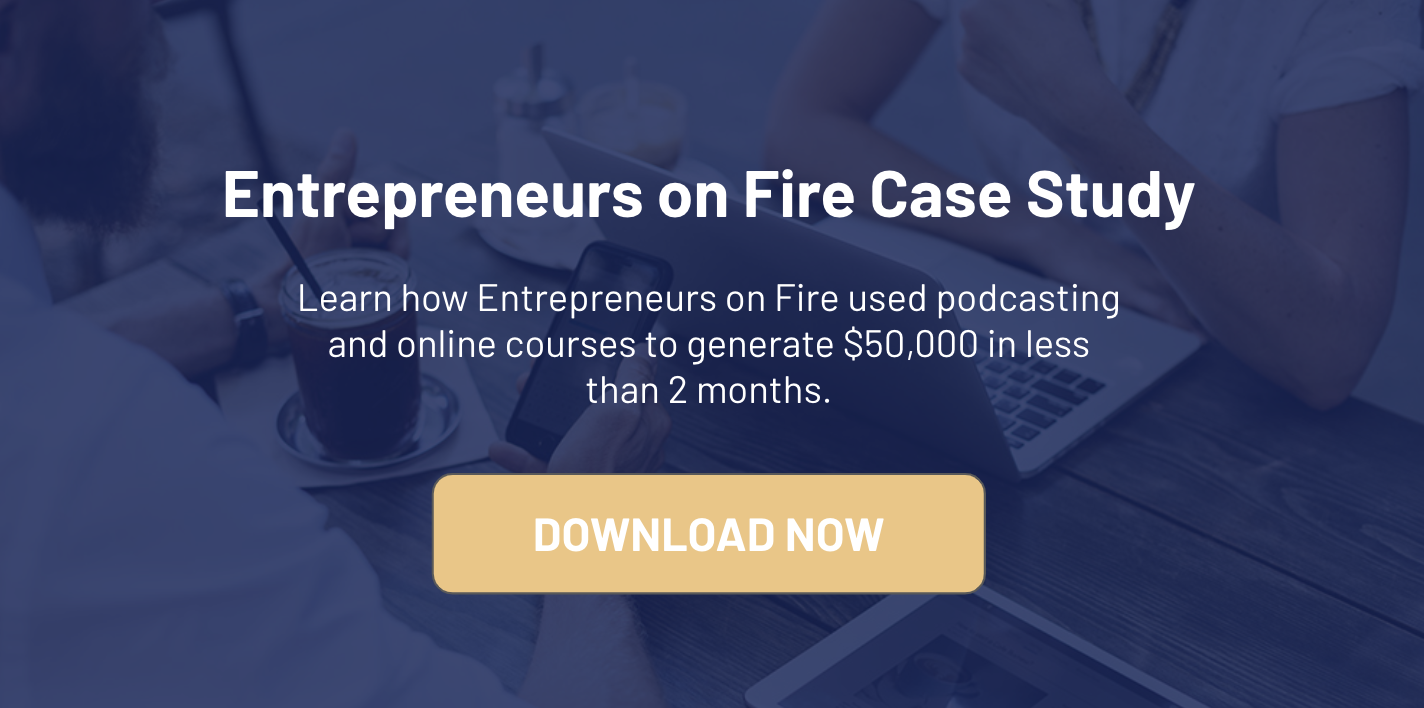The online education industry is booming and as an online course creator, you have a slice of that pie.
But what do you do when you see sales dropping and you’ve already exhausted your lead magnets, written countless blogs, and tapped out your email list?
When this time comes (as it undoubtedly will for most online course creators) you need a new way to communicate with your audience. In this article, I’m going to show you how starting a podcast can transform the way you engage with your audience and help generate new sales for your online course.
Before I begin, perhaps you can relate to this scenario?
Meet our fictional friend, Steve. He is a freelance digital marketer who makes money through various revenue streams – consulting, sponsored blog posts and online courses on his website, www.marvellousmarketer.com.
At the start of the year, he decided to develop an online course on a subject he is constantly asked for advice on: social media marketing.
At first, sales went well. He created the course ’The ultimate guide to social media for your business’ on Thinkific and promoted it to his network. But following the launch of his course, both the excitement and sales quieted down. Despite receiving great feedback on the course, Steve was now struggling to make sales.
This position is one that many course creators have found themselves in. They have a course with amazing content, but they struggle to generate consistent sales.
Does this sound familiar?
If you’re experiencing similar reality, you’re not alone. And don’t worry, there’s no need to stay stuck there. In this article I’m going to outline 6 reasons why starting a podcast is a great strategy for building a loyal audience and boosting your online course sales.
1. Podcasting is accessible to all
Podcasts are a brilliant form of content marketing for so many reasons, but the number one reason is their accessibility.
Listeners have the option to play podcasts wherever they want, whenever they want – while commuting, exercising, or doing errands at home. As long as listeners have access to a smartphone, computer or speaker, they can access your content on the go.
Similarly, it’s a very accessible medium for course creators. At a basic level, all you need for starting a podcast is internet access and a voice recorder. Even your smartphone can do the trick (if you want to learn how to start a podcast using whatever equipment you have available, check out the Podcast Success Academy).
This brings me to my next point…
2. Podcasting allows you to reach the people you’ve been unable to reach through blogs, email marketing, or social media
Since people have unique learning preferences, starting a podcast opens up another pool of people to access.
Many people simply don’t like to read blogs or emails, or have the time to. By starting a podcast, you have access to an entirely new audience of people who love listening to audio. People who you simply wouldn’t have reached before.
Just look at some of the most successful online influencers who do this. Do you think that internet personality Gary Vaynerchuk sticks to just one format of content? Wrong! He has a podcast, a blog, a YouTube channel, does email marketing, and has multiple social media accounts. He has thousands of loyal fans, but they pick and choose how to consume content depending on what they like
While you may not be Gary Vaynerchuk, it is worth assessing whether you could reach an untapped segment of your target audience with podcasting. Consider how podcasting can grow your audience and help you reach a new set of people by augmenting your current marketing mix. This could open up a whole new way to speak to your fans and potential customers about your online course.
Making your podcast discoverable through apps like iTunes, Stitcher, and Google Podcasts will help build your credibility as people being to see you as an expert, and open up an entirely new audience of avid listeners to discover you.
A tip here in connecting with your audience right off the bat is to pick a name that simply and clearly describes what you have to offer.
Pro tip: Make sure the name of your podcast “does what it says on the tin”.
Make sure to pick a podcast name that makes it obvious to potential listeners what you do.
For example, our hypothetical friend Steve could call his podcast “The Marvellous Marketers Podcast” so when people search for marketing podcasts, his would come up in the search results.
As his podcast gets more reviews and ranks in more search results over time, more people will be likely to find his podcast organically.
If he named it something irrelevant such as “The Steve Show”, this wouldn’t tell people who he is, what he does, or why they should listen.
3. You have the freedom to talk about anything you want, the way you want
Podcasts are great because you can talk about absolutely any subject. Cheese and wine course creator and enthusiast? What about Puerto Rican craft beer or the history of football?
Continuing the example of Steve’s fictional business, since his online business centers on marketing topics, starting a podcast could make sense for him. He can create short, bite-sized episodes, or longer ones to go with the topics he covers in his blogs and online courses.
Here’s an example of how he could create content for a podcast to suit his business. He could record a podcast episode called, “The 5 biggest social media mistakes and how to solve them”, and discuss topics that he covers in more depth in his online course. The episode could act as a subtle sales pitch for the course, and leave the listener with a call to action like, “if you want to level up your social media and start creating engaged traffic, check out my online course, The ultimate guide to social media for your business today”. By offering an exclusive discount code from the podcast, listeners would have an even bigger incentive to engage.
If you have a very niche business, don’t worry. Some of the most profitable podcasters have niche topics, yet are able to monetize them and improve their businesses without masses of downloads.
By starting a podcast to boost your online course sales, you could create say, a month of podcast content where each week is based around pushing a different online course that you sell.
Pro tip: Many online courses fail because the creator thinks about making money before they think about the content.
Content truly is king and adding value to your customers should be your number one priority in absolutely everything that you do.
With this in mind, planning your podcast episodes and titles is paramount to podcasting success.
Good episode titles should be either curiosity based or benefit-driven. For example, “The top social media mistakes and how to avoid them” is better than “Social media tips for beginners”.
You can also use websites such as Answer The Public to research potential episode titles and see if you are answering questions people are already searching for. Using this approach will do wonders for your podcast’s visibility.
4. You can interview industry professionals to add credibility to your podcast and course
One of the industry’s most successful podcasters is John Lee Dumas.
John started out his podcasting journey by interviewing an entrepreneur every single day on his podcast Entrepreneurs On Fire. He started out the same way that all podcasters do, as a complete newbie with no history in podcasting or credibility to his name.
Being able to interview high-profile entrepreneurs and leveraging their profile and reach was the catalyst to John’s podcasting success.
After publishing an episode, the first thing he would do was email the guest and thank them for their input, asking them to share the interview amongst their networks.
This approach allowed him to use his guests’ followings to increase Entrepreneurs On Fire’s exposure and really get his name out there. It worked for him, and it can work for you, too!
To further expand your reach, you can also create a strategy to get interviewed on top podcasts in your industry. There is a podcast out there for every industry niche, and making it a priority to share your expertise through others’ podcasts can also help you market and grow your own.
Pro tip: In every niche, there are industry experts and people who others would like to hear from.
Create a list of the top 10 people you could interview for your podcast and send them an email explaining who you are, and why you’d like to interview them.
Even as a completely new podcaster, being honest, open and polite can get you far. Everyone has to start somewhere!
Want to learn how John Lee Dumas used podcasting and online courses to grow his following and revenue? Look at our Success Stories for more information on how he did it!
5. You can create a loyal following of listeners who are more likely to buy from you
Through the success of John’s podcast Entrepreneurs On Fire, he has built a loyal following of listeners which has enabled him to launch multiple successful side ventures.
First was Podcasters’ Paradise, a community that helps podcasters to grow and monetize their podcasts.
Then came The Freedom Journal, a book that guides you to achieving your number one goal in just 100 days. After the successes of The Freedom Journal, he created The Mastery Journal, to help people become more productive and focussed on their goals. In addition to the journals, John offers his community online courses where he leads them step-by-step towards reaching their goals, and growing their businesses.
Through these side ventures working alongside his podcast, he created a brand that has generated a net income of over 9 million dollars since 2012. None of this would have been possible without the loyal following he has accumulated from his podcast. How you could you follow this example to chart a similar path and promote your online course on a podcast?
It won’t happen overnight but when done properly, podcasting has the potential to send your online course sales through the roof.
Pro tip: You need to consider how you want to brand your podcast.
You could brand it as a separate, standalone brand. However, if you will be using it as a sales tool for your online course, I would advise that you incorporate it into your existing brand so that people can easily make the connection that it is affiliated with you.
Don’t try to be too clever with your branding. Similar to your podcast’s name, it needs to “do what it says on the tin”. Remember that the icon that people will see in apps such as Google Podcasts is tiny so logo-wise, go for maximum impact with a small amount of design work.
6. Podcasts are easy to edit and evolve if something’s not working
Starting a podcast in one way doesn’t mean you have to roll with it in that same format forever. You can change the length of the podcast, the subject, the show format, how often you post it, and the type of people you interview.
Entrepreneurs on Fire started out as a daily podcast, and that’s how it became a success. People wanted short, consistent, and motivational episodes they could listen to every day, anywhere at any time. But today, the format and cadence of his podcast looks a little different. Over time, John decided that his existing podcast format no longer fit what he was trying to accomplish, and turned the daily podcast into a weekly one.
The beauty of podcasting is that you have the freedom to make “in-flight” adjustments to constantly innovate and improve it for your listeners.
Pro tip: Not only can you generate more sales for your online course by creating a podcast that adds value to your listeners’ lives, but Podcasts also act as another vehicle of your business that can bring in revenue itself.
Podcasters big and small monetize their podcasts through sponsorships and brand collaborations. As you grow and develop, you can also create opportunities to attract these kinds of sponsorships to grow your business.
So where do you go from here?
Starting a podcast can be hugely beneficial for boosting your online course sales, but we know from experience that getting a podcast up for the first time can be pretty daunting. There’s a lot to learn and take in. If you want to learn more about how to start a podcast, join the free Podcast Success Academy to access workshops, downloads, and resources that will help you in your exciting, new podcasting journey. Good luck!
How Starting A Podcast Can Help Boost Your Online Course Sales @podcastwebsites #podcasting #onlinecourses #teachonline Click To Tweet
Hannah McCreesh is a writer for podcastwebsites.com, an all-in-one WordPress service made just for podcasters.







